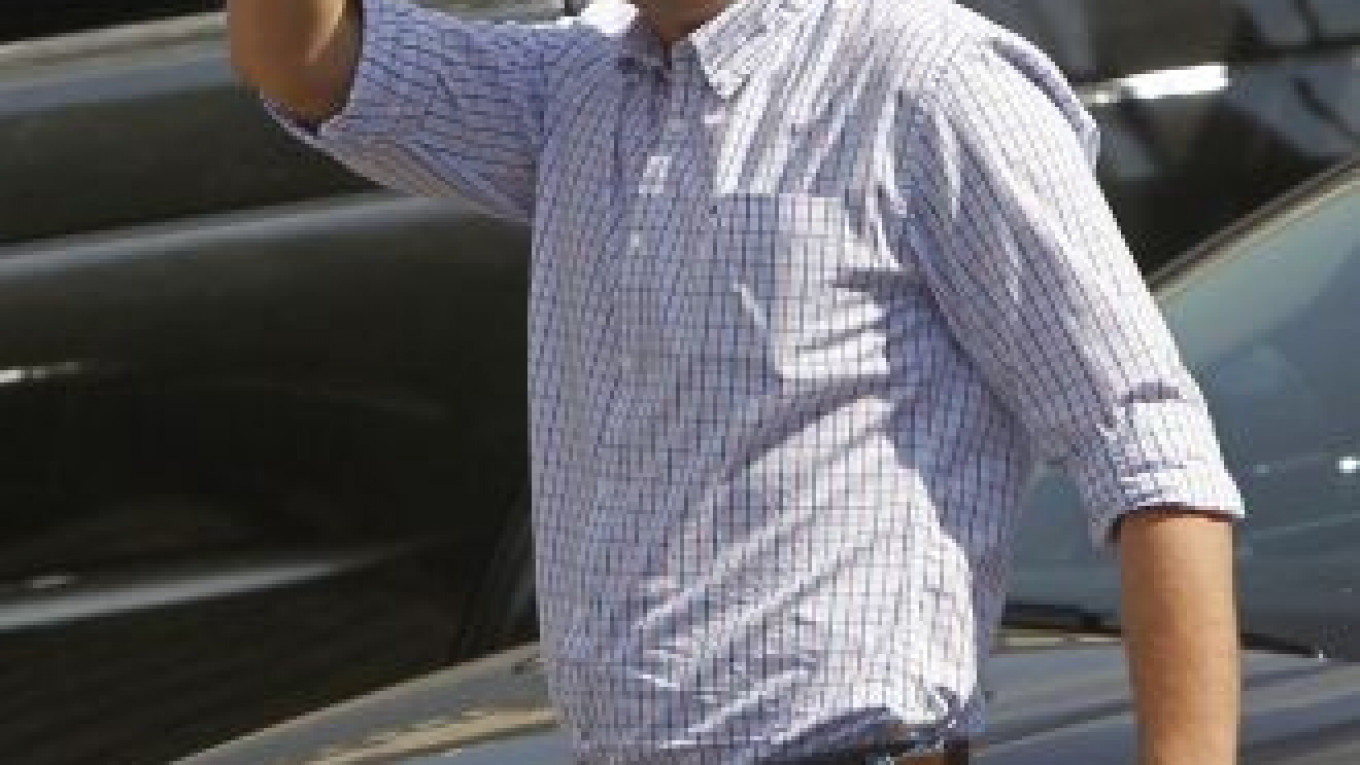Opposition leader Alexei Navalny compared himself to jailed former oil tycoon Mikhail Khodorkovsky after prosecutors charged him with organizing the theft of timber products from a state company in 2009, a crime that carries a maximum punishment of 10 years in prison.
“All these jokes about how Khodorkovsky stole all the oil and Navalny stole an entire forest — this is essentially what has happened,” Navalny told reporters outside the office of the Investigative Committee, Interfax reported.
He denied wrongdoing.?
Khodorkovsky was convicted in 2010 of essentially stealing all the output of his Yukos oil company for several years.
Supporters say Khodorkovsky, who was arrested in 2003 on tax evasion charges and sentenced to prison through 2016, is being punished for challenging Vladimir Putin’s Kremlin.
Investigators said Tuesday that Navalny and two other suspects are believed to have stolen 10,000 cubic meters of timber products from state-owned KirovLes between May and September 2009, when Navalny was an adviser to Kirov Governor Nikita Belykh.
The purported theft cost the Kirov regional government 16 million rubles ($497,000) in damages, they said in a statement.
Navalny has been barred from traveling outside Moscow and the surrounding Moscow region.
He is arguably the most influential leader of the opposition movement, which has mounted an unprecedented challenge to Putin and his regime in recent months. While the Kremlin has passed a series of laws that crack down on the opposition, Tuesday’s charge against Navalny represents the toughest measure yet against an opposition leader.
Veteran human rights defender Lyudmila Alexeyeva was quick to call Navalny's case an attack on the opposition, adding that his only “crimes” were exposing corruption and participating in sanctioned rallies, Interfax reported.
Navalny, a lawyer by training, called the theft charge “strange and absurd,” citing inconsistencies with the results of an earlier investigation that was closed in 2011.
“The man who earlier accused me of deceiving him is now my partner-in-crime,” Navalny told journalists.?
He also said the 16 million ruble figure was ludicrous because it exceeded KirovLes' profit from the goods in question.
The charge came as a surprise because Navalny had been under investigation for allegedly pressuring KirovLes into a disadvantageous contract, a crime punishable by up to five years in prison.
Navalny said he has appealed the Investigative Committee's decision to re-open the case.
Investigative Committee head Alexander Bastrykin publicly chastised investigators for closing the case, citing hacked e-mails that raised questions about Navalny's business dealings with Belykh.
Last week, Navalny published documents that appeared to support a 2008 news report accusing Bastrykin of concealing real estate, business interests, and a residence permit in the Czech Republic. Bastrykin has denied the claims.
Supporters wearing the opposition’s white ribbons and buttons reading “Russia without Putin” stood outside the Investigative Committee building. A woman staged a one-person picket with a sign that said, “Free all political prisoners,” Interfax reported.
A Message from The Moscow Times:
Dear readers,
We are facing unprecedented challenges. Russia's Prosecutor General's Office has designated The Moscow Times as an "undesirable" organization, criminalizing our work and putting our staff at risk of prosecution. This follows our earlier unjust labeling as a "foreign agent."
These actions are direct attempts to silence independent journalism in Russia. The authorities claim our work "discredits the decisions of the Russian leadership." We see things differently: we strive to provide accurate, unbiased reporting on Russia.
We, the journalists of The Moscow Times, refuse to be silenced. But to continue our work, we need your help.
Your support, no matter how small, makes a world of difference. If you can, please support us monthly starting from just $2. It's quick to set up, and every contribution makes a significant impact.
By supporting The Moscow Times, you're defending open, independent journalism in the face of repression. Thank you for standing with us.
Remind me later.


